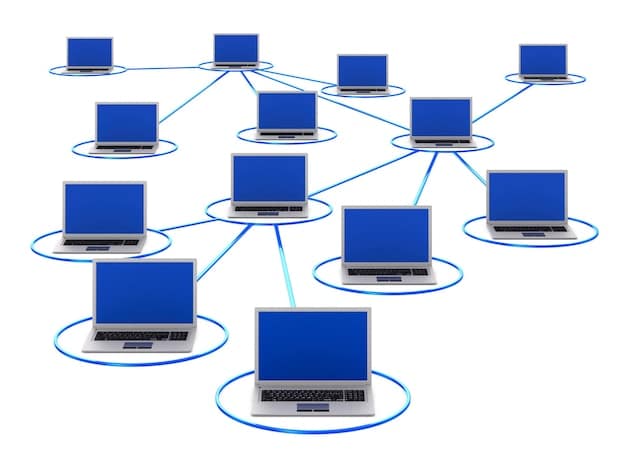Blockchain Beyond Crypto: Real-World US Market Applications

Blockchain technology extends far beyond cryptocurrencies, offering transformative applications across various sectors in the US market, including supply chain management, healthcare, and digital identity verification.
The term “blockchain” often conjures images of Bitcoin and other cryptocurrencies. However, the potential of blockchain beyond cryptocurrency: real-world applications in the US market is rapidly becoming a reality, reshaping industries and offering innovative solutions to longstanding challenges. Let’s delve into how this technology is changing the face of the US market.
Understanding Blockchain Technology
Blockchain technology is essentially a distributed, decentralized, public ledger. This means that data is recorded in blocks, which are chained together chronologically and secured using cryptography. This structure makes it incredibly difficult to alter or tamper with the data, providing a high level of security and transparency.
Key Features of Blockchain
Understanding the core characteristics of blockchain is crucial to grasping its widespread applicability. Here are some standout features:
- Decentralization: No single entity controls the blockchain, ensuring data is distributed across multiple nodes.
- Transparency: All participants can view transactions, promoting trust and accountability.
- Immutability: Once data is recorded, it cannot be altered, ensuring data integrity.
- Security: Cryptographic techniques secure the blockchain, making it resistant to tampering and fraud.

These key features underpin the transformative potential of blockchain across various sectors. From enhancing supply chain transparency to securing digital identities, blockchain’s unique characteristics make it a valuable tool.
Supply Chain Management
One of the most promising real-world applications of blockchain is in supply chain management. Traditional supply chains often suffer from opacity and inefficiency, making it difficult to track products from origin to consumer. Blockchain offers a solution by providing an immutable record of each step in the supply chain.
Benefits of Blockchain in Supply Chains
Blockchain can streamline processes, reduce fraud, and create greater transparency. Here are several specific benefits:
- Enhanced Traceability: Track products at every stage, from manufacturing to delivery.
- Reduced Counterfeiting: Verify the authenticity of goods to combat fraud.
- Improved Efficiency: Automate processes and reduce paperwork.
- Increased Transparency: Provide consumers with verifiable information about the origin and journey of products.
Several US companies are already leveraging blockchain to enhance their supply chain operations. For example, Walmart uses blockchain to track the origin of its produce, ensuring food safety and reducing the time it takes to trace contaminated items. This not only protects consumers but also enhances Walmart’s brand reputation.

Healthcare Revolution
The healthcare industry in the US faces significant challenges related to data security, interoperability, and patient privacy. Blockchain technology offers innovative solutions to these problems by providing a secure and transparent way to manage patient data.
How Blockchain Can Transform Healthcare
Blockchain can create a more efficient, secure, and patient-centric healthcare system. Here are a few key applications:
- Secure Medical Records: Store patient data securely and allow patients to control access.
- Improved Data Interoperability: Enable seamless data sharing between healthcare providers.
- Drug Supply Chain Integrity: Track medications from manufacturer to patient, preventing counterfeit drugs from entering the market.
- Clinical Trial Management: Enhance the transparency and integrity of clinical trial data.
Companies like Change Healthcare are exploring blockchain solutions to improve claims processing and reduce fraud. By creating a shared, immutable ledger of transactions, blockchain can help streamline administrative processes and improve the accuracy of healthcare billing.
Digital Identity Verification
In an increasingly digital world, verifying identity securely and efficiently is crucial. Blockchain can provide a decentralized and tamper-proof solution for digital identity verification, reducing fraud and improving user experience.
Advantages of Blockchain-Based Digital Identities
Traditional identity verification methods are often centralized and vulnerable to fraud. Blockchain offers a more secure and user-centric approach:
Using blockchain for digital identity allows individuals to have greater control over their personal information. They can selectively share data with verified entities, reducing the risk of identity theft and data breaches. This approach also streamlines onboarding processes for various services, making it easier for users to access online platforms and applications.
Financial Services Innovation
The financial services industry is another area ripe for blockchain innovation. From faster and cheaper cross-border payments to decentralized finance (DeFi) applications, blockchain is transforming the way financial transactions are conducted.
Blockchain technology can significantly reduce the time and cost associated with international money transfers. Traditional systems often involve multiple intermediaries, leading to delays and high fees. Blockchain-based solutions can streamline this process, making it faster and more cost-effective.
Decentralized finance (DeFi) is an emerging area that leverages blockchain to create open and permissionless financial services. DeFi platforms offer a range of services, including lending, borrowing, and trading, without the need for traditional financial institutions. This can provide greater access to financial services for underserved populations.
- Faster Payments: Reduce settlement times for domestic and international transactions.
- Lower Transaction Fees: Eliminate intermediaries and reduce costs.
- Enhanced Security: Protect against fraud and cyber threats.
Challenges and Future Outlook
Despite its vast potential, the adoption of blockchain technology in the US market faces several challenges. These include regulatory uncertainty, scalability issues, and a lack of widespread understanding of the technology. However, as blockchain technology matures and regulatory frameworks become clearer, its adoption is expected to accelerate.
Overcoming Barriers to Adoption
Addressing the challenges facing blockchain adoption requires a multi-faceted approach. Here are some key areas to focus on:
- Regulatory Clarity: Governments need to provide clear and consistent regulations to foster innovation and protect consumers.
- Scalability Solutions: Developing scalable blockchain solutions is crucial to handling high transaction volumes.
- Education and Awareness: Increasing public understanding of blockchain technology is essential for widespread adoption.
| Key aspect | Brief description |
|---|---|
| 🚀 Blockchain Technology | Decentralized, transparent, and immutable ledger technology enhancing data security. |
| 📦 Supply Chain | Improved traceability, reduced counterfeiting, and enhanced efficiency in supply chains. |
| 🩺 Healthcare | Secure medical records, interoperability, and drug supply chain integrity. |
| 🔒 Digital Identity | Decentralized identity verification enhancing security and user control. |
FAQ
What is blockchain technology?
Blockchain is a decentralized, distributed ledger that records transactions across many computers. It’s known for its transparency and security.
How can blockchain improve supply chain management?
Blockchain offers enhanced traceability, reduces counterfeiting, and increases efficiency by providing a transparent record of each stage in the supply chain.
What are the benefits of using blockchain in healthcare?
Using blockchain allows for secure medical records, improved data interoperability, and enhanced drug supply chain integrity, reducing fraud.
How does blockchain enhance digital identity verification?
By providing a decentralized and secure solution for identity verification, blockchain reduces fraud and improves user experience.
What are the main challenges facing blockchain adoption in the US?
Challenges include regulatory uncertainty, scalability issues, and a lack of widespread understanding of the technology and uses for Blockchain based systems.
Conclusion
Blockchain beyond cryptocurrency: real-world applications in the US market presents a myriad of opportunities for innovation and transformation. From revolutionizing supply chain management to enhancing data security in healthcare and financial services, it holds the potential to address long-standing challenges and drive economic growth. As the technology matures and regulatory frameworks become clearer, we can expect to see widespread adoption, transforming industries and improving lives across the US.





